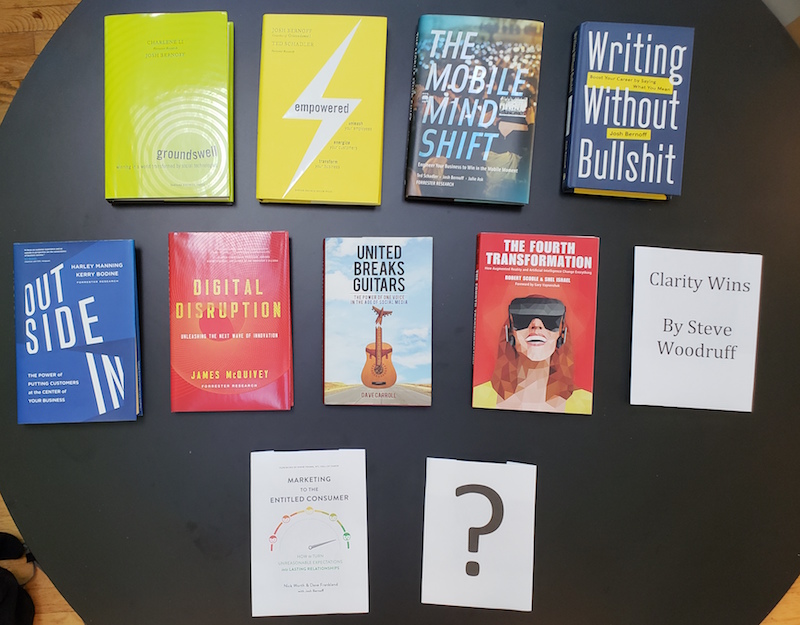Doing work that matters
 The best life for a writer is to spend your days writing and editing prose that matters. This is not easy, but it is rewarding. And that attitude should apply to whatever work you do.
The best life for a writer is to spend your days writing and editing prose that matters. This is not easy, but it is rewarding. And that attitude should apply to whatever work you do.
This year I am getting to enjoy, shall we say, a wide variety of work. For example:
- The ghostwriting project where the final stages somehow had to fall into my vacations. It was worth it. I’ll review edits in a lodge in Vermont or on a houseboat in Amsterdam if the project demands it. Now my collaborators are my friends and we have a book we can all be proud of.
- The other ghostwriting project that’s drawing on every bit of creativity I have, and continues to lurch forward far slower than I’d prefer. The result will be a book that redefines the way people think about the Internet. That’s a good use of my time.
- The corporate identity project that’s proving to be the hardest 1000 words I ever wrote. The client keeps insisting that it’s not good enough, and making me go back to the source material. This is challenging my idea of what I’m capable of as a writer. But the feedback is legit and the work keeps improving. When it’s done (soon), I’ll take pride in having gotten there.
- The editing project for the writer who’s got it all figured out . . . except in those little spots where he tends to go astray. He takes the feedback and comes back with stuff that’s gone from good to great. That’s rewarding.
- The editing project for the authors who’ve got major jargon, passive voice, and sentence structure problems. Hacking through this prose is work. But when I’m done editing it, if they take my advice, their vast experience is going to generate a comprehensive business strategy book.
- The workshops for government contractors, nonprofit marketers, and health care professionals. These people have cultural challenges with writing, but when I’m done with them, they’ll do a lot better.
Why this effort is all worthwhile
These projects are so different, but I am enjoying all of them. Here’s why:
- I get to use all of my skills. At this point in my career, if it has to do with writing, I’d like to believe I’m the best guy to do it. These projects tap all of my experience and accumulated knowledge.
- I have to stretch. I have to learn about AI, big data, small business, customer service, internet security, and marketing automation. I have to master Web copy, legal jargon, and every kind of business book. If I’m learning new stuff, I’m happy. When I stop learning, check my pulse, because I’m probably dead.
- These are great ideas. Every one of these projects is about a great idea. Maybe I’m just an idea collector, but if you have a great idea, I’d be exhilarated to work on it.
- The results are worthwhile. I have no interest in text no one will read. If your audience is important to you, I want to make you look smart in front of them.
- The people are worthwhile, too. I like all of these clients. Some have become good friends. I don’t work for schmucks.
- They clients have the right attitude towards collaboration. I don’t pull my punches as an editor or collaborator. I’ve been pleased to see that the reaction to frank and sometimes harsh criticism has been nothing but gratitude. I’ve had the same experience on the other end: if my writing is not good enough, just tell me what’s wrong and I’ll work hard to fix it. Great collaborators are hard on the product and easy on the people, because that’s how you get to a great endpoint without hating each other.
What this means for your career
I can’t help but think there are lessons here for anyone who hopes to do useful work. I know there are lessons I should have paid attention to when I was younger.
I spent time on useless projects, doing things that were too easy, or aspiring to promotions by attempting to please bosses. Those efforts were mistakes.
If you’re hoping to get ahead and feel good about doing it, my experiences of the last year might give you a template.
Concentrate on doing the work at least as much as finding the work.
Take projects that use your skill set, but will help you extend it.
Don’t work with assholes. There are plenty of non-assholes, and you can get along with and appreciate all of them if you put a little effort in.
If you’re idle, find something worth working on. Create. Or you’re wasting yourself.
Don’t do anything that will compromise your integrity. Quit or refuse.
Produce things you can be proud of — because that’s a way not only to feel good, but to get referrals and recommendations.
Respect the talents and desires of the people you work for and with. Nobody does great work alone. Listen to the people who are paying you and give them what they need, even if it’s a little different from what they ask for.
You can’t do all of these things all of the time. But if you as many as you can as frequently as you can, you’ll feel pretty good about what you’re doing — and you’ll create a sustainable path to getting ahead in your career.
Good post. I guess to sum it up – if you keep your integrity, you’ll stay motivated to keep doing higher and higher quality work.
I caught you on the Publishing Profits podcast yesterday. Great interview!